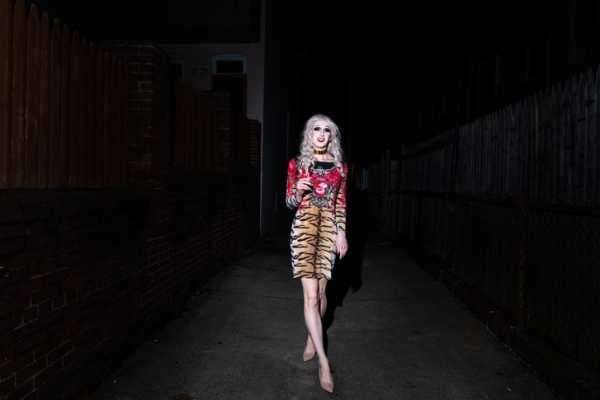
In April, Alek Minassian, a twenty-five-year-old from Toronto, wrote a Facebook post—“The Incel Rebellion has already begun!”—and then drove his car into a crowd of pedestrians. For many people, this news raised two questions: Is there no depth to which the human soul will not sink? and What’s an incel? Only one of those questions was Googleable. So, in the ensuing weeks, people searched the word “incel” thousands of times. What they got in return was a list of links: links to news articles (“Inside the Dark World of ‘Incels’ ”), links to Urban Dictionary and Wikipedia (“Incels are members of an online subculture who define themselves as unable to find a romantic or sexual partner . . . ”), and dozens of links to YouTube, Google’s hugely influential video platform (news segments about incels, diatribes ridiculing incels, even sympathetic interviews with incels).
Natalie Wynn, the creator of the comico-philosophical YouTube channel ContraPoints, wanted to make a video that was both more trenchant and entertaining than the others. “I knew mine would involve some light mockery,” she told me recently. “How could it not? I also knew that I’d have to make clear, at some point, that incel ideology is dangerous—which, when you’re talking about a woman-hating death cult, does seem worth mentioning. But I also wanted to keep digging until I had a theory about how someone might start out in a decent place and end up in such a fucked-up place.” This approach was not a sop to civility—Wynn, who has called herself a “leftist propagandist,” had no interest in representing both sides of an imaginary debate. “I wasn’t looking for my kumbaya moment with a misogynist,” she said. “I didn’t want to empathize. I wanted to understand.”
Three years ago, Wynn dropped out of Northwestern’s Ph.D. program in philosophy. (She later called academic philosophy “a guided tour of history’s most boring homosexuals.”) She moved to Baltimore, drove an Uber, and started making videos about, according to her YouTube bio, “Sex, drugs, and social justice.” She now has a thriving Patreon page, which affords her a comfortable full-time living with enough left over for a fairly lavish costume budget. Her videos combine slapstick and dark surrealism, Foucauldian banter and Fleetwood Mac covers, subtle metaphysical insights and unsubtle dick jokes, and calls for socialist revolution made in pink wigs and designer heels. She is one of the few Internet demi-celebrities who is as clever as she thinks she is, and one of the few leftists anywhere who can be nuanced without being boring. She knows her way around a syllogism, but she also knows that persuasion is not reducible to reason—that the best arguments, on their own, do not always win. Or, as she put it in a recent video, “Politics is aesthetics.”
After the Toronto attack, Wynn spent weeks lurking on the incels’ subreddits and message boards, taking in their warped ethos. She wrote a script and revised it several times; when it was ready, she purchased costumes (a powdered wig, from Etsy; a sequinned shawl, from Amazon) and props (a beret, frozen corn dogs, a model human skull). Then she cleared her calendar, holed up in her two-bedroom apartment, and spent a week shooting and editing. The final version of the video is thirty-five minutes long, and has been viewed more than a million times. In it, she defines incel ideology as “more than the dogma that you can’t get laid. It’s also the dogma that, because you can’t get laid, you can never be happy.” According to “a classic incel meme,” Wynn says, the only thing separating an incurable virgin from a natural-born alpha male is “literally a few millimetres of bone”: the width of a man’s wrists, the shape of his jawline. Wynn acknowledges how ludicrous this sounds. “It’s pretty tempting to just mom the shit out of these kids,” she says—to correct their thinking and nudge them to make some friends. “But most incels don’t want to hear this kind of advice.” So Wynn tries another approach. “Hello, boys,” she says, facing the camera and swirling a glass of white wine, as smooth jazz plays in the background. “Let’s talk about bone structure.”

“I watch a lot of YouTube makeup tutorials,” Wynn said.
Photograph by Kate Warren for The New Yorker
Not all of YouTube is political, but the parts that are lean overwhelmingly to the right. YouTube conservatism ranges from bow-tied Burkeanism to florid madness about Zionist-occupied government; and, as has been noted many times, YouTube’s recommendation algorithms can turn even the most innocuous video search into a brush with potential radicalization, sometimes within two or three clicks. It could be said that ContraPoints videos debunk pernicious ideologies the way that Snopes articles debunk false rumors, but that comparison sells Wynn’s style short, precisely because she has a style. “I sometimes imagine a hypothetical nineteen-year-old boy looking for answers,” Wynn said. “He knows that life in this late-capitalist wasteland feels off, that something in his life is missing. What’s he going to find on YouTube that can explain that void to him? Well, there’s mainstream stuff, which he’s likely to tune out. And then there’s a whole lot of Fascist alt-right propaganda and Alex Jones-style nut-baggery. And then there’s me.”
In her video, after she explains why incel ideology is a trap, Wynn sets out to answer a more difficult question: What could possibly make such a trap alluring? Around the seventeen-minute mark, the lighting changes. (Wynn specifies each lighting scheme in her scripts.) “I’m gonna tell you something I’ve never really come out about on this channel,” she says. “I used to live as a man.” This is a joke—it’s true that Wynn is trans, but she’s never concealed this from her audience. (Wynn started ContraPoints when she was still “in man mode,” and loyal viewers have, in a sense, followed her gender transition in real time.) The way she delivers the joke—adding, in bratty millennial upspeak, “this is, like, a really vulnerable moment for me”—is classic ContraPoints: sincerity wrapped, for protection, in a sequinned shawl of irony.
“I know what it’s like to obsess over millimetres of bone,” she continues. “I actually had to interrupt work on this video to go to a consultation for facial-feminization surgery so I can pay luxury-car amounts of money to shave off a few millimetres of bone here and there.” When she was deciding whether to transition, Wynn says, she spent many torturous hours online, “intentionally looking for abusive comments, preferably ones that cut to the core of my deepest insecurities and fears.” Some psychologists refer to such behavior as “digital self-harm.” Wynn calls it “masochistic epistemology: whatever hurts is true.” This, she posits, is the pathological urge that drives otherwise normal men to self-identify as incels. “We’re all obsessed with the bones, honey,” she says. Against her better judgment, she had arrived at empathy.
A few weeks ago, I took a train to Baltimore and got to Wynn’s apartment shortly before dark. When she answered the door, her face was so ghostly white that I could barely make out her features. “Sorry, I’m at an awkward intermediate stage of the makeup process,” she said. In her bedroom, she sat in front of a vanity and continued the process—rouge, then contouring, then a few coats of lipstick. “I watch a lot of YouTube makeup tutorials,” she said. “I also watch a lot of channels where all they do is eat inhumanly huge amounts of food. I’m trash, basically, is what I’m saying.” In early ContraPoints videos, Wynn stood in front of an impressively crammed bookshelf (Rawls, Lacan, Gramsci). These days, the books are stashed in a closet, and the visible artifacts in the apartment are homages to anime, absinthe, bodybuilding, and John Waters. (“Politics is aesthetics.”)
Wynn was about to start shooting a video, and she was already in costume: a form-fitting Roberto Cavalli cocktail dress with a gaudy tiger print. She applied a swoop of black eyeshadow above each eye, then unboxed a pair of press-on lashes. “In grad school, I led a bit of a double life,” she said. “I don’t mean gender-wise—I just mean intellectually.” By day, she struggled to parse Husserl in the original German; by night, she watched a lot of YouTube—“ ‘Christopher Hitchens destroys creationist in debate,’ that kind of thing,” she said. She stumbled on a subculture of YouTubers who called themselves skeptics. “A lot of smug young men who wanted to prove how sophisticated they were by saying ‘There is no God’ over and over,” she said. “I can’t judge them too hard, though, because I was one of them.”
Then, around 2014, “they started posting videos about how feminism is cancer and Black Lives Matter is going to destroy us all. Before you know it, some of them became straight-up Fascist sympathizers. I was, like, ‘What is happening? Is no one else seeing this?’ I wasn’t living as a woman yet—I wasn’t even really a feminist yet—but I knew enough to be alarmed.” She resented having to say the obvious—that authoritarianism is bad, for example—but, instead of letting that resentment stymie her, she incorporated it into her YouTube persona. “For the sake of moving on with this video, I’m not going to argue that it’s wrong to be a Nazi—I’m just going to assume it,” she said in one early YouTube diatribe. “I thought this was one of the three biggest lessons from the last thousand years of Western history . . . but here we are.”
When her makeup was done, she walked downstairs to a room she reserved for video shoots—crimson curtains, damask wallpaper, a piano decorated with mannequins and candelabras. Placed strategically around the room were several colored L.E.D. light bulbs. “You can modify the colors with an app,” she said, demonstrating on her phone. “I would say that this, plus my ability to change a camera battery while wearing press-on nails, are my biggest achievements”—bratty millennial voice —“as a filmmaker.” She scrolled through the script on her phone, checking to make sure she had all the necessary props. “Clipboard, ruler, Bible,” she said. “I think we’re good to go.”

Wynn is preoccupied with the chasm between the left’s ability to criticize and its ability to proselytize.
Photograph by Kate Warren for The New Yorker
She adjusted a boom mike, sat on a settee, and checked her shot in a monitor. “I’m already hungry, but I can’t eat without messing up my lipstick,” she said. “This had better go fast.” Then, using a remote control, she started rolling. “Words, words, words. What do they even fucking mean?” she began. “Well, I don’t know, and I don’t care, but we have to talk about it anyway, because of a boy named Ben Shapiro.”
Shapiro, a conservative pundit, refuses to call transgender people by their preferred pronouns, claiming that referring to a chromosomally male person as “she” would be “a lie.” Wynn swiftly poked a half-dozen holes in his argument. “It is not I who misunderstands biology, Ben Shapiro; it is you who misunderstands language,” she said. Despite a few botched takes—she had to repeat “snowflake-smashing refusal” a few times before getting it right—she was making good time. “It’s going to take me less time to wreck Ben Shapiro than it took me to curl my hair,” she said. She compared this video to one she’d made six months earlier, about Jordan Peterson—a member, like Shapiro, of the so-called Intellectual Dark Web. “A ContraPoints video is never going to be framed as ‘I’m so offended by this idea,’ ” she said. “It’s not, ‘I’m so intimidated by my opponent’s big, masculine brain.’ It’s more, ‘I’m bored of you, and also you’re a dum-dum.’ ”
She finished in less than an hour. There would be more to shoot in the coming days, after she received shipments of new costumes and props; after that, she would spend several days editing the video, then adding music and last-minute effects. For now, though, she was done. She wiped off her lipstick, changed into sweatpants, and ordered in from a nearby restaurant.
Sitting at her kitchen table, Wynn returned to one of her preoccupations: the chasm between the left’s ability to criticize and its ability to proselytize. An earlier ContraPoints video opened with an m.c., played by Wynn, announcing two public speakers, also played by Wynn. “Ladies and gentlemen, a Fascist,” the m.c. says. The Fascist is poised. The Fascist is coolheaded. The Fascist’s rhetoric, if you’re not listening closely, sounds sensible and patriotic. The audience cheers. Then the m.c. says, “Ladies and gentlemen, a leftist.” The leftist is halting, hostile, and condescending. “So, actually, according to Hegel, the for-itself can only be actualized through the in-itself,” she begins. The audience giggles and boos. “Aw, fuck you, you fucking racists!” the leftist responds, giving the audience the finger.
The food arrived—goat curry and chana masala—and Wynn pulled back her hair and started to eat. “You often hear, with regard to the alt-right or the Intellectual Dark Web or pro-Trump nationalists, that the way to avoid normalizing them is to avoid responding to them, or to only respond by calling them offensive and terrible and bad,” she said. “And, look, sometimes they are offensive and terrible and bad, but you don’t win by saying that. You win by pointing out why they’re wrong, and by making better propaganda than they do.” When Wynn posted the final version of the video to YouTube, several commenters wrote that it had made them reconsider their views. “I didn’t even know what cis meant until I stumbled on your videos,” one wrote. “I guess I just wanted to thank you, as cheesy as it sounds . . . I know how rare it is to change someone’s opinion on the internet.”
Sourse: newyorker.com






